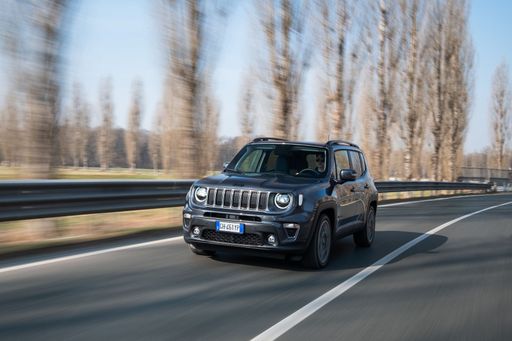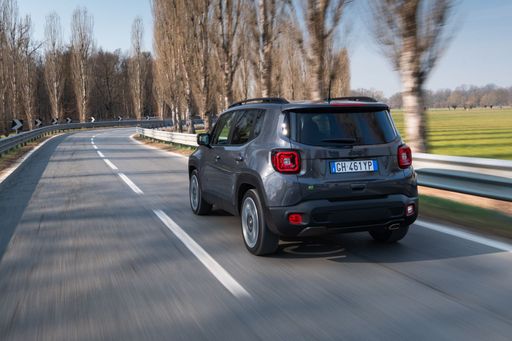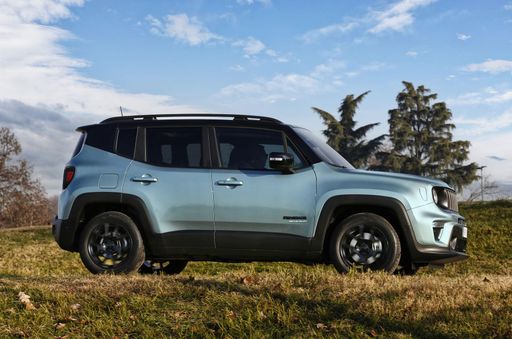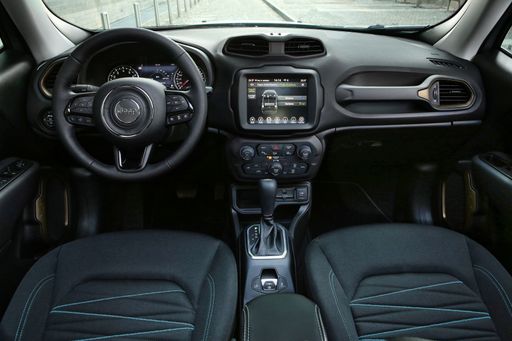Hyundai Tucson vs Jeep Renegade - Differences and prices compared
Compare performance (288 HP vs 240 HP), boot space and price (20900 £ vs 26700 £ ) at a glance. Find out which car is the better choice for you – Hyundai Tucson or Jeep Renegade?
Costs and Efficiency:
Price and efficiency are often the first things buyers look at. Here it becomes clear which model has the long-term edge – whether at the pump, the plug, or in purchase price.
Hyundai Tucson has a distinct advantage in terms of price – it starts at 20900 £ , while the Jeep Renegade costs 26700 £ . That’s a price difference of around 5760 £.
Fuel consumption also shows a difference: Jeep Renegade manages with 2.10 L and is therefore evident more efficient than the Hyundai Tucson with 2.70 L. The difference is about 0.60 L per 100 km.
As for electric range, the Hyundai Tucson performs clearly better – achieving up to 70 km, about 34 km more than the Jeep Renegade.
Engine and Performance:
Under the bonnet, it becomes clear which model is tuned for sportiness and which one takes the lead when you hit the accelerator.
When it comes to engine power, the Hyundai Tucson has a somewhat edge – offering 288 HP compared to 240 HP. That’s roughly 48 HP more horsepower.
In acceleration from 0 to 100 km/h, the Jeep Renegade is minimal quicker – completing the sprint in 7.10 s, while the Hyundai Tucson takes 7.50 s. That’s about 0.40 s faster.
In terms of top speed, the Hyundai Tucson performs slight better – reaching 204 km/h, while the Jeep Renegade tops out at 199 km/h. The difference is around 5 km/h.
There’s also a difference in torque: Hyundai Tucson pulls clearly perceptible stronger with 379 Nm compared to 240 Nm. That’s about 139 Nm difference.
Space and Everyday Use:
Beyond pure performance, interior space and usability matter most in daily life. This is where you see which car is more practical and versatile.
Both vehicles offer seating for 5 people.
In curb weight, Jeep Renegade is barely noticeable lighter – 1420 kg compared to 1542 kg. The difference is around 122 kg.
In terms of boot space, the Hyundai Tucson offers clearly more room – 620 L compared to 351 L. That’s a difference of about 269 L.
In maximum load capacity, the Hyundai Tucson performs distinct better – up to 1799 L, which is about 502 L more than the Jeep Renegade.
When it comes to payload, Jeep Renegade minimal takes the win – 570 kg compared to 545 kg. That’s a difference of about 25 kg.
Who wins the race in the data check?
The Hyundai Tucson is decisively ahead in the objective data comparison.
This result only shows which model scores more points on paper – not which of the two cars feels right for you.
Costs and Consumption
View detailed analysis
Engine and Performance
View detailed analysis
Dimensions and Body
View detailed analysis

Hyundai Tucson
Hyundai Tucson
Hyundai Tucson marries bold, sculpted looks with a clever, roomy cabin that feels smarter than its price tag suggests. It's composed on the road, easy to live with day-to-day, and a sensible choice for buyers who want SUV style without the showroom theatrics.
details




Jeep Renegade
The Jeep Renegade wears its chunky, boxy looks like a badge of character, blending genuine off-road swagger with city-friendly manners so it feels at home on a muddy trail or a tight urban lane. Inside you'll find a surprisingly practical cabin with rugged touches and clever storage, making it a sensible choice for buyers who want a compact SUV with personality rather than just another anonymous crossover.
details




Costs and Consumption |
|
|---|---|
|
Price
20900 - 47900 £
|
Price
26700 - 39200 £
|
|
Consumption L/100km
2.7 - 7.6 L
|
Consumption L/100km
2.1 - 5.5 L
|
|
Consumption kWh/100km
-
|
Consumption kWh/100km
-
|
|
Electric Range
63 - 70 km
|
Electric Range
36 km
|
|
Battery Capacity
-
|
Battery Capacity
-
|
|
co2
62 - 172 g/km
|
co2
48 - 125 g/km
|
|
Fuel tank capacity
52 - 54 L
|
Fuel tank capacity
36 - 48 L
|
Dimensions and Body |
|
|---|---|
|
Body Type
SUV
|
Body Type
SUV
|
|
Seats
5
|
Seats
5
|
|
Doors
5
|
Doors
5
|
|
Curb weight
1542 - 1893 kg
|
Curb weight
1420 - 1770 kg
|
|
Trunk capacity
546 - 620 L
|
Trunk capacity
330 - 351 L
|
|
Length
4525 - 4535 mm
|
Length
4236 mm
|
|
Width
1865 mm
|
Width
1805 mm
|
|
Height
1650 mm
|
Height
1684 - 1718 mm
|
|
Max trunk capacity
1795 - 1799 L
|
Max trunk capacity
1277 - 1297 L
|
|
Payload
518 - 545 kg
|
Payload
545 - 570 kg
|
Engine and Performance |
|
|---|---|
|
Engine Type
Petrol, Full Hybrid, Plugin Hybrid, Diesel MHEV
|
Engine Type
Petrol MHEV, Plugin Hybrid
|
|
Transmission
Manuel, Automatic
|
Transmission
Automatic
|
|
Transmission Detail
Manual Gearbox, Dual-Clutch Automatic, Automatic Gearbox
|
Transmission Detail
Dual-Clutch Automatic, Automatic Gearbox
|
|
Drive Type
Front-Wheel Drive, All-Wheel Drive
|
Drive Type
Front-Wheel Drive, All-Wheel Drive
|
|
Power HP
136 - 288 HP
|
Power HP
130 - 240 HP
|
|
Acceleration 0-100km/h
7.5 - 11.6 s
|
Acceleration 0-100km/h
7.1 - 9.7 s
|
|
Max Speed
196 - 204 km/h
|
Max Speed
191 - 199 km/h
|
|
Torque
250 - 379 Nm
|
Torque
240 Nm
|
|
Number of Cylinders
4
|
Number of Cylinders
4
|
|
Power kW
100 - 212 kW
|
Power kW
96 - 177 kW
|
|
Engine capacity
1598 cm3
|
Engine capacity
1332 - 1469 cm3
|
General |
|
|---|---|
|
Model Year
2025
|
Model Year
2024
|
|
CO2 Efficiency Class
F, D, E, B
|
CO2 Efficiency Class
D, B
|
|
Brand
Hyundai
|
Brand
Jeep
|
What drive types are available for the Hyundai Tucson?
Available configurations include Front-Wheel Drive or All-Wheel Drive.




